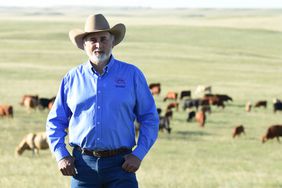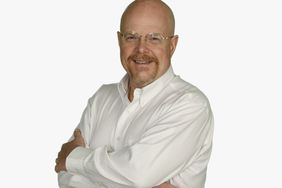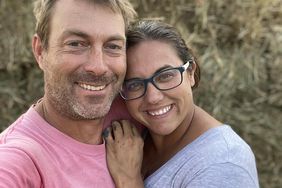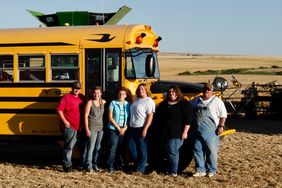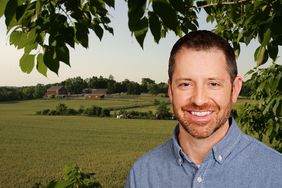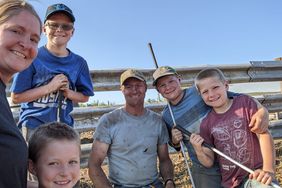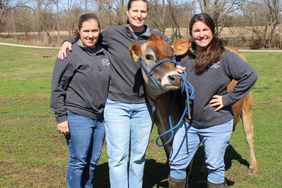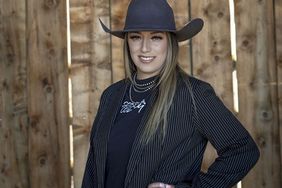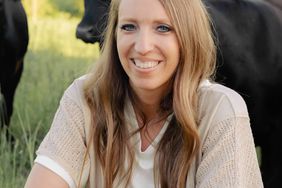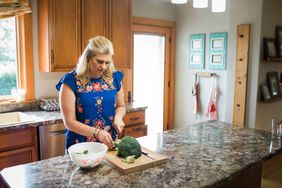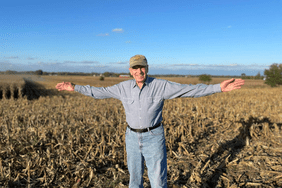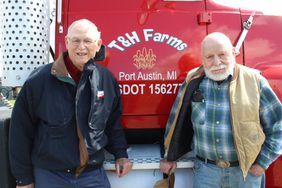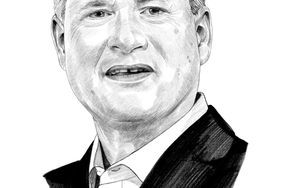:max_bytes(150000):strip_icc()/Brent20Rendel20Illustration-83abd9fa7bd341bd894c223dc687eb60.jpg)
Brent Rendel's family has farmed their homestead for longer than Oklahoma has been a state. Yet, returning home to Miami in the far northeastern corner of Oklahoma wasn't a part of his original plan. An Oklahoma State University graduate, Rendel spent his postcollege years in the Navy working as a submarine officer and nuclear engineer. "When I got out of college, the last thing I wanted to do was stay in Oklahoma and farm," he says. "But after about seven years in the Navy, the only thing I wanted to do was come back to the farm." In 1996, he became a third-generation farmer. Today, Rendel takes a science-minded approach to farming by conducting on-farm research, hosting field days, and connecting with other farmers online.
SF: How does your military experience translate to farming?
BR: Farming is one of those glorious jobs where you're your own boss. You get to pay for your own mistakes, and you get the reward of your successes. The Navy exposed me to the idea that there are a whole lot of ways to do the same job. You also don't have to be the smartest person in the room. You just have to know who the smartest person in the room is, and listen to them. I've got a whole network of Extension and industry people I reach out to for advice.
SF: How did you get involved in on-farm research?
BR: My college degree is in mechanical engineering, and after graduation I was a nuclear engineer for the Navy. The whole technical background of engineering has always been attractive to me. My first exposure to actually doing on-farm research was when Oklahoma State was trying to expand their in-field use of the GreenSeeker technology they developed. We had some surprising results in that the sensor was saying I didn't need any nitrogen at all on a wheat field. I didn't necessarily believe it, but I went ahead and tried it while doing all the other wheat normally. Low and be-hold, the field yielded just as good as all of the others. That sparked in my mind that there has to be better ways of doing things, and the only way to know if it's right or wrong is to test what works.
SF: What's the best advice you've been given?
BR: Don't be afraid to fail. Even in the middle of a terrible drought with no soil moisture, I'm still going to plant my beans and wheat. It's either going to work or it's not. I can't control whether it's going to rain or not, so I'll worry about the things I can control. You can't be in the farming game and not be willing to fail.
SF: What is the best and worst part about being involved in agriculture?
BR: The best part is that everyday is a new start. Even when you're in the combine every day, that only lasts for a week or two. No two years are alike and no two crops are alike. I like that my schedule is very fluid. I might have a general idea of what I'm going to do, but you never know for sure. Something might break and suddenly I'm a repairman for a day.
The worst part is that nothing is guaranteed. I don't have a job off the farm, so I succeed or fail on the farm. There are years that go by where I have to pay for the privilege of farming. Even in those years, you still have to farm and try, and that can be a daunting task.
SF: What excites you about the future of agriculture?
BR: I'm excited to see a lot of farmers thinking outside the box. I think the internet, and particularly social media, has played into that because it's made a big world much smaller. I follow people on Twitter and a lot of them don't farm around here. Consumers have been begging to have a stronger connection to those that produce their food, and now we have that ability. I think in another 10 years or so, a lot of farmers and ranchers are going to know their customers. It's not going to be this faceless economy where I grow my corn, take it to a grain elevator, and that's the end of it.
Background
Brent Rendel grows 4,000 acres of wheat, corn, and soybeans in northeast Oklahoma. He farms with his mother and nephew and works with Oklahoma State University Extension specialists to conduct on-farm research. An avid Twitter user and field day host, he relies on collaborations to improve his farm.
:max_bytes(150000):strip_icc()/headshot-bc4ff3c0c50c4e1cb8156ba02e8bf428.jpg)

